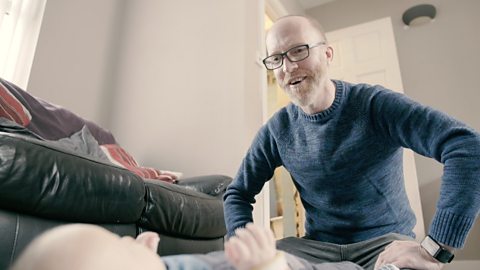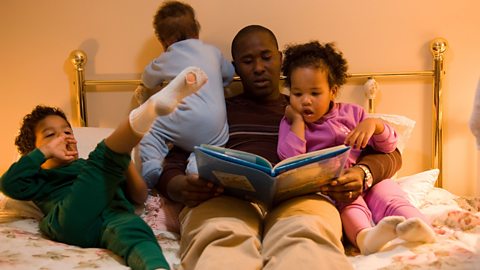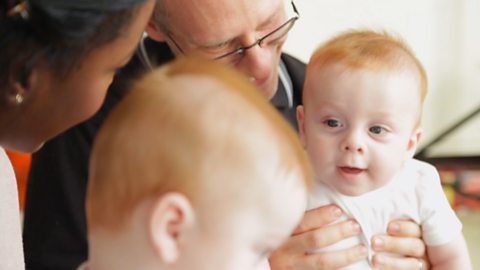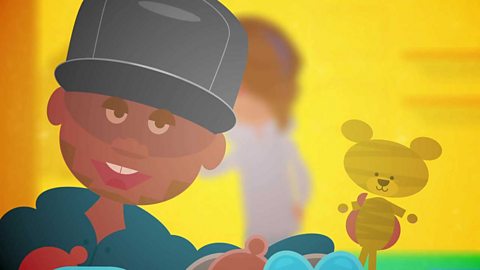Changing a nappy is something that you have to adapt to very quickly as a new parent, although it can be quite a daunting job at first.
The good news is, there are ways of making your life a bit easier when it comes to your babyŌĆÖs changing routine. We spoke to health visitor Kerry Bennett from Better Start Bradford, who told us that, in fact, nappy changes can be precious bonding moments. ŌĆ£You can see it as just another task in a busy day with your child, or you can really make it a moment that matters as you get a chance to just stop and have some really good face to face contact.ŌĆØ
So how can you make nappy changes work for you, while also providing a quality bonding and learning opportunity for your little one?
What do I need to change a nappy?
One of the key questions when it comes to nappy changing is what you need to take with you when youŌĆÖre out and about so that you can swiftly deal with the situation in hand. According to Kerry, travelling light is key, ŌĆ£just go with what you need, the bare minimum. The more added extras you have, the more things youŌĆÖre likely to leave behind in a baby changing room.ŌĆØ
But what things does she recommend you carry?
- A couple of clean nappies (more or less, depending on how long you expect to be out)
- A change mat or towel
- Something to clean your baby with (cotton wool and warm tap water ideally, or wet wipes if necessary)
- Something to put dirty nappies in
- A set of clean clothes for baby
- A barrier cream for baby if this is something you normally use
A dad looks back at the first time he changed a nappy in public.
Where should I change a nappy?
KerryŌĆÖs answer when asked about the best place to perform a nappy change is a simple one: ŌĆ£somewhere safeŌĆØ. By this, she means somewhere where no harm can come to your baby.
ŌĆ£The safest place to change a baby is the floor. I would always, always choose to change a baby on the floor unless the floor was dirty.ŌĆØ Otherwise, if you have to change your baby on a changing table or on another raised surface, Kerry stresses that itŌĆÖs important to have all of the things you need within reach and in front of you to avoid having to turn your back. ŌĆ£You want to think ŌĆśIŌĆÖm in a safe place, IŌĆÖve got all the things I need around meŌĆÖ and youŌĆÖre not leaving your baby to roll off anywhere.ŌĆØ
How do I change a nappy?
The NHS has on how to change a nappy, including a video with a midwife. In short, these are the basic steps to take:
- Take off the dirty nappy.
- Clean your baby ŌĆō use the nappy to remove most of the poo, then follow up with the warm water and cotton wool or wet wipes to clean the whole nappy area. Be careful to wipe from front to back as you clean them.
- If you have time and itŌĆÖs warm enough, try and let your baby have some time without the nappy on before putting on the new one. This gives them time to dry and can help avoid nappy rash.
- Apply barrier cream if necessary to your babyŌĆÖs bottom.
- Slide the clean nappy under your babyŌĆÖs bottom and fasten it up.
- Place the dirty nappy into whatever bag you may have for it.
- Wash your hands thoroughly.
How to make nappy changes more enjoyable
Try not to see it as a chore
Sure, nappy changes are sometimes a dirty job but they can also be magical moments of one-to-one time with your child.
Find ways to make the most of the eye contact you have.
You could softly sing to newborn babies, whether itŌĆÖs a traditional nursery rhyme, our ŌĆśWee, Wee, PooŌĆÖ song written specifically for this moment, or your favourite new track on the radio. ŌĆ£It doesnŌĆÖt have to be a nursery rhyme,ŌĆØ says Kerry, ŌĆ£you could put on some tunes and have a little dance in front of baby. If it raises a giggle, itŌĆÖll help your stress too.ŌĆØ
As well as singing, hands-on play with your baby is ideal for nappy-changing time as it allows babies to feel your touch. ŌĆ£ŌĆśAlong Came a SpiderŌĆÖ, tickle time and blowing raspberries on their tummy - all of those things can be fun and unlimited in their appeal.ŌĆØ
As children get older, they also get wrigglier, which can pose problems in getting things done. But it can just mean a change of approach to distract children and focus their attention. You could try using their senses for example, asking them to listen out for the things they can hear or look out for what things they can see. Kerry suggests involving toddlers in their own nappy changes, getting them to fetch nappies and hold the things you need as you change them.
She has an ingenious suggestion for a game to play with them too. ŌĆ£Sleeping Lions ŌĆō toddlers love that. ŌĆśCan you keep as still as you can while I get this nappy changed?ŌĆÖŌĆØ
No matter the age, thereŌĆÖs no pressure to make nappy time magical, but itŌĆÖs worth trying to make the most of it where possible. ŌĆ£WeŌĆÖre not saying you have to make every nappy change this meaningful interaction by any means, but I think it's just an opportunity, just to sort of pause in the day with your baby,ŌĆØ says Kerry. Taking a moment to distract your baby from whatŌĆÖs going on can stop them from wriggling and generally make it a more enjoyable experience for you too. ŌĆ£We know all the baby brain development that comes from interaction, but equally it makes it less stressful for you.ŌĆØ
The Wee Wee Poo song, a great go-to song for a nappy change with baby!
Be prepared
ŌĆ£Talking to parents I know, this has been the main bit of advice IŌĆÖve heard: ŌĆśbe preparedŌĆÖ,ŌĆØ says Kerry. ŌĆ£Be ready to get covered in a bit of poop. Take spare clothes for baby out with you. Know that accidents do happen.ŌĆØ As well as expecting the unexpected, Kerry is keen to stress that this also means thinking through your plan of action: ŌĆ£Be prepared with the stuff that you need around you so you haven't got poop everywhere and you're scrambling around for things.ŌĆØ Not only is this important from a practical point of view, but also helps you keep your child safe by keeping an eye on them throughout.

Try not to stress
ŌĆ£Parents often get hung up on their babiesŌĆÖ pooing,ŌĆØ says Kerry. And it doesnŌĆÖt help that the worst nappy situations often come at the least welcome times. ŌĆ£ItŌĆÖs that time you go in for their first immunisations, at the supermarket, or the first time youŌĆÖre meeting a friend for a coffee in a long time,ŌĆØ says Kerry. ItŌĆÖs bound to get to you sometimes, but try to stay calm and collected, know that all parents go through this and try to make it as pleasant as you can. ŌĆ£It can be overwhelming. But if youŌĆÖre smiling and your baby smiles back at you, it can boost your endorphins and that interaction between you will help with your stresses.ŌĆØ
Kerry recommends that you be kind to yourself and accept any offers to help. ŌĆ£If youŌĆÖve got someone who can help you out and change a nappy, like your other half, a grandparent or a friend, then accept that help. The change of face can be a fun distraction for baby too.ŌĆØ
And donŌĆÖt worry too much about how often your baby poos. ŌĆ£Every baby is different. Just know whatŌĆÖs normal for your baby and if they havenŌĆÖt pooed for a while, then look for other symptoms that indicate that they may not be ok. If youŌĆÖre concerned, speak to your health visitor or GP.ŌĆØ
Nappy changes can provide an opportunity for older siblings to learn, while they help you out too.






